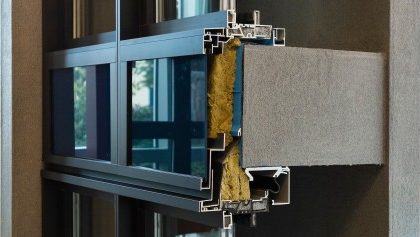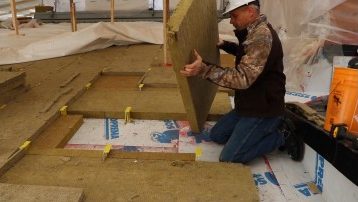by Brianna Crandall — August 12, 2019 — Canada-based Cascadia Windows & Doors introduced a new roofing application for its cladding clips and a new fiberglass-framed window wall system in recent weeks that are engineered to improve thermal performance in commercial buildings.
Cascadia Clip
Cascadia introduced a novel application for the company’s patented, award-winning cladding clip, using the pultruded fiberglass support on sloped roofs. Since 2011, the Cascadia Clip has significantly improved the thermal performance of exterior cladding by dramatically reducing thermal bridging and heat transfer, claims the company. Recently released installation and technical information now allows architects and specifiers to reap those same benefits in commercial sloped roofs.
Boasting roughly 30-50% reduction in thermal bridging over typical sloped roofing support — while offering the same structural performance — the Cascadia Clip also mitigates the risk of condensation on the underside of the roof decks and screws. The overall low conductivity of the Cascadia Clips addresses both issues — issues most people don’t even know exist, notes the company.
Michael Bousfield, technical director at Cascadia, explained:
Traditionally, thermal performance in roof construction has focused on the R-values of insulation materials, but much of the thermal bridging in a roof is through the roof supports themselves. They’re the direct connection between the living space and exterior environment. Without addressing the supports, the insulation can only be so effective.
Improved thermal efficiency is only one facet of the Cascadia Clips’ benefit in this innovative application. When used with sloped roofs, Cascadia Clips offer significant cost savings over traditional supports by allowing architects and specifiers to design thinner roofs. This reduces not only the amount of materials used in the roof, but also the labor associated with installing those materials — all while addressing the underlining issue of roof support thermal bridging.
James Bourget, principal and construction specialist of RDH Building Science, was the key innovator of the Cascadia Clip application in roofing applications and proved his vision in practice. Bourget remarked:
The thermally broken rainscreen metal roof system is an ideal choice because it’s both simple and energy efficient.
Often high-performance systems can be arduous and time consuming to install. This high-performance system installation is designed to utilize a “production format” intended to maximize installation efficiency and minimize labor costs. By dividing your overall crew on site into multiple smaller teams, you can stagger the installation and have one team directly follow the next.
It has been demonstrated on many projects that the production rate for a metal roof installation is truly maximized when using this strategy. What is amazing is that both “production” and “high-performance” have come together to create an efficient, thermally broken, pressure-moderated rainscreen roof assembly.
Available in a variety of sizes, the Cascadia Clip offers architects and specifiers yet another incremental improvement towards improving commercial building performance.
For more information about the Cascadia Clip, visit the company’s website.
Universal Series Window Wall
Cascadia also launched what it touts as the “world’s first” fiberglass-framed window wall system. The Universal Series Window Wall marks an innovative step forward in energy-efficient building technology, allowing architects and specifiers to substantially improve the overall thermal performance of commercial and high-rise buildings without sacrificing window size or glass area, says the company.

Spandrel at slab bypass of new aluminum-fiberglass hybrid window wall by Cascadia Windows. (Photo: Business Wire)
Boasting comparable structural performance, lifespan and price-point to traditional aluminum window walls, the Universal Series Window Wall can improve a building’s thermal performance by 50% to 150% compared to traditional aluminum, largely due to the inherent thermal efficiency of the window wall’s fiberglass frame, claims Cascadia.
Available with both double- and tripled-paned glass, the Universal Series Window Wall delivers R4 & R7 thermal performance, respectively, and leverages similar technology as the company’s Passive House Certified (US and International) series of windows and doors. This designed-in-North-America system is said to arrive at an opportune time for the construction industry.
Cascadia Windows & Doors President Mike Battistel explained:
Jurisdiction[s] across North America are aggressively outlining better energy efficiency requirements for commercial buildings. Over the last 20 years, traditional commercial windows haven’t improved as much as other building products, but they represent a very significant part of the building envelope. The efficiency levels of windows impact everything from the sizing of heating and cooling systems to general comfort and livability of the space.
And that was one of the main catalysts for the development of the Universal Series Window Wall, says the company. As more aggressive building codes come into effect across Canada and the US, the Cascadia team recognized architects and specifiers were finding themselves having to trade natural light and a more livable building for energy efficiency.
Battistel stated:
Our Window Walls provide architects and specifiers the best of both worlds. They can design exciting, engaging buildings that people want to live and work in, all while delivering better building efficiency. They don’t have to choose between the two. In almost all cases our window walls exceed the most stringent code requirements.
According to the company, the benefits of the Universal Series Window Wall go beyond just efficiency — the product also helps a building’s bottom line. Apart from reducing costs associated with construction of a building’s overall heating and cooling infrastructure, the Universal Series Window Wall reduces energy consumption over the life span of the building. And with a life span of between 50-75 years, those savings can add up.
Battistel concluded:
We’re very excited about the Universal Series Window Wall, not just for what it can offer the building industry, but how it can help slow climate change and deliver more livable spaces.
For more information about the Universal Series Window Wall, visit the Cascadia website.
Founded in Langley, British Columbia, Canada, in 2008 by a collective of building science and window specialists, Cascadia manufactures resilient, versatile, and sustainable building envelope products including windows, doors, and cladding support systems forged from high-quality pultruded fiberglass.





